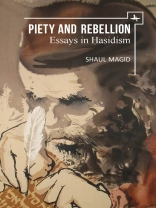Piety and Rebellion examines the span of the Hasidic textual tradition from its earliest phases to the 20th century. The essays collected in this volume focus on the tension between Hasidic fidelity to tradition and its rebellious attempt to push the devotional life beyond the borders of conventional religious practice. Many of the essays exhibit a comparative perspective deployed to better articulate the innovative spirit, and traditional challenges, Hasidism presents to the traditional Jewish world.
Piety and Rebellion is an attempt to present Hasidism as one case whereby maximalist religion can yield a rebellious challenge to conventional conceptions of religious thought and practice.
Cuprins
Acknowledgements
Introduction—My Way to (Neo) Ḥasidism
Early Ḥasidism
Chapter 1 “What happened, happened”: R. Ya’akov Yosef of Polonnoye on Ḥasidic Interpretation
Chapter 2 The Case of Jewish Arianism: The Pre-existence of the Ẓaddik in Early Ḥasidism
Chapter 3 The Intolerance of Tolerance: Maḥaloket (Controversy) and Redemption in Early Ḥasidism
Chapter 4 The Ritual Is Not the Hunt: The Seven Wedding Blessings, Redemption, and Jewish Ritual as Fantasy in R. Shneur Zalman of Liady
Chapter 5 Nature, Exile, and Disability in R. Nahman of Bratslav’s “The Tale of the Seven Beggars”
Later Ḥasidism
Chapter 6 Modernity as Heresy: The Introvertive Piety of Faith in R. Areleh Roth’s Shomer Emunim
Chapter 7 The Holocaust as Inverted Miracle: R. Shalom Noah Barzofsky of Slonim on the Divine Nature of Radical Evil
Chapter 8 The Divine/Human Messiah and Religious Deviance: Rethinking Ḥabad Messianism
Chapter 9 Covenantal Rupture and Broken Faith in R. Kalonymus Kalman Shapira’s Eish Kodesh
Chapter 10 American Jewish Fundamentalism: Ḥabad, Satmar, Art Scroll
Despre autor
Shaul Magid is the Jay and Jeanie Schottensten Professor in the Borns Jewish Studies Program at Indiana University and Kogod Senior Research Fellow at The Shalom Hartman Institute of North America. He is a member of the American Academy of Jewish Research. His work spans the areas of Kabbalah, Hasidism, and Modern Jewish Thought and Culture.







![Copertina de Brian Schrag & Julisa Rowe: Community Arts for God's Purposes [Chinese] 貼近神心意的社群藝術 Copertina de Brian Schrag & Julisa Rowe: Community Arts for God's Purposes [Chinese] 貼近神心意的社群藝術](https://static.worldofdigitals.com/thumb_webp/740/9781645083740.webp)




